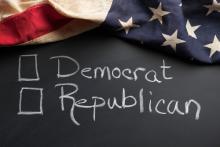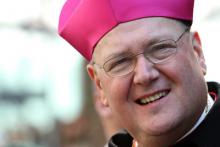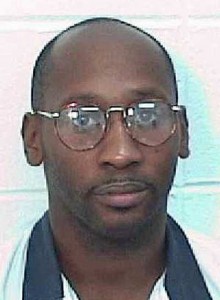debate

Editor's Note: Tweet @newshour to ask the candidates to #TalkPoverty in Wednesday's debate.
Marianne Williamson, a bestselling author and convener of the upcoming Sister Giant conference on women and politics, has called on President Obama and former Governor Mitt Romney to address “a meaningful array of topics” – including poverty, money in politics and incarceration rates in the U.S. – tonight during the first presidential debate.
Williamson talked to us earlier today about these issues, which are particularly pressing for Christians who take Matthew 25 seriously.
The interview was edited for length and content.
Q: What are you doing to get these issues out there?
A: Having a voice and creating your own platform is not all that difficult with today’s technology. I think what’s happening now is that, firstly, people are realizing that. Secondly, people are realizing that there are certain things that need to be said that simply are not being said as loudly as other things being said. When it comes to a politics of conscience, why wouldn’t we expect that during the debates there would be a conversation about the 23.1 percent of America’s children living in poverty, or the 34 percent of poor children, or the 46 million Americans living in poverty?

I was invited to appear on a Detroit radio show this past week called Christ and the City, hosted by Christopher Brooks. It’s a right-leaning talk show with an evangelical focus, but I was energized and encouraged by the conversation because it was respectful and substantive. We didn’t see eye to eye on much (as you’ll hear), but we made space for the differences, trusting that listeners would reflect on the broadened perspective, with the hope of being enriched in the process.
The premise of the interview was a discussion of my book, Banned Questions About the Bible, but you’ll soon realize as you listen that we got into all sorts of other interesting topics, such as salvation, interpretation of scripture and the difference between “Truth” and “Fact” in the Bible.

With the Republican and Democratic National Conventions having taken place over the last two weeks, we can officially say that we’re entering the election season (i.e., that time when the general public begins to pay attention).
A couple of friends who pastor churches in non-D.C. parts of the country asked me if we feel the need to address politics at The District Church, being in the very belly of the beast (my words, not theirs). Specifically, they were asking: Given the intense polarization and often-unproductive arguing that we see around us, even in the church, about the need to address how we interact with those who disagree with us.
So far, we haven’t needed to. In our church community, we have Republicans, Democrats, Independents, and yes, even people who don’t care about politics; we have Hill staffers, White House staffers, activists, advocates, lobbyists, policy wonks, and more — and we’ve all come together as the body of Christ, recognizing that our allegiance is first to Jesus before any party or even country.
Even so, every four years (or every two, if you pay attention to mid-terms; or all the time, if you’re even more politically engaged), posts about politics pop up with increasing frequency on social media, eliciting often-furious back-and-forths that usually end up doing nothing more than reminding each side how right they are and how stupid the other side is.
So I figured I’d try to offer a few suggestions on how we can engage with one another on matters of politics in healthy ways.

The news that New York Cardinal Timothy Dolan, the nation’s most prominent Catholic prelate, will deliver the closing blessing to the Republican National Convention in Florida next week was seen as a huge coup for Mitt Romney, the party's presumptive nominee. But the move has also prompted a sharp debate within the church over the increasingly close ties between leading bishops and the GOP.
“The cozy relationship between a sizable portion of U.S. bishops and the Republican Party should be cause for concern, and not just among progressive Catholics,” Michael O’Loughlin wrote in a post on the website of America magazine, a leading Catholic weekly published by the Jesuits.
“Cardinal Dolan’s appearance in Tampa will damage the church’s ability to be a moral and legitimate voice for voiceless, as those who view the Catholic Church as being a shill for the GOP have just a bit more evidence to prove their case,” O'Loughlin concluded.

Back in the 1970s, when I still was living near William F. Buckley in Switzerland close to my parent’s ministry, L’Abri Fellowship, from time to time the author would visit my mother and father for tea.
My late father (the theologian Francis Schaeffer) and Buckley had little in common apart from a shared love of art, the Swiss Alps, and a sense that the West was in a decline that only Christianity could reverse — even if they would not have agreed on what that word “Christianity” meant. WFB was a bon vivant Roman Catholic and Dad was a “biblical inerrancy” fundamentalist.
Dad would serve tea, but I could tell that, as the afternoons wore on, Buckley might have preferred an offer of something a bit “stiffer,” as the Brits call a real drink. Later, in the early '80s, Buckley and I were comparing notes about speaking (I’d just addressed the Southern Baptist convention before I fled the evangelical scene), and he mentioned that he agreed with Winston Churchill who said, "You can't make a speech on ice water."
Dad was a teetotaling Presbyterian. Notwithstanding, Buckley — perhaps to annoy my father — once said, rather pointedly, that he always demanded a couple of glasses of wine before taking to the podium.
When I learned of Gore Vidal’s passing Wednesday, I recalled Buckley talking to Dad and me about how Vidal and he used to go hammer-and-tongs arguing on TV — mostly on Buckley’s program Firing Line — only to go have a drink together after the show.

The Higgs boson is perhaps better known by its sexier nickname: the "God particle."
But in fact, many scientists, including the physicist for whom it is named, dislike the term.
In 1993 when American physicist Leon Lederman was writing a book on the Higgs boson, he dubbed it "the goddamn particle." An editor suggested "the God particle" instead.
One thing is clear: The July 4 discovery that marked a new chapter in scientific knowledge also reignited debate over the universe’s origins — and the validity of religious faith as scientific knowledge expands.
The Higgs boson explains why particles have mass — and in turn why we exist. Without the boson, the universe would have no physical matter, only energy.
The cosmological implications are hotly debated. Can God fit in a scientific story of creation?

On Nov. 30, at Gordon College in Wenham, Mass., Sojourners CEO Jim Wallis and Arthur Brooks of the American Enterprise Institute, debated the question, "Is Free Enterprise Moral?"
The event was sponsored by the Center for Christian Studies and the Jerusalem and Athens Forum at Gordon as part of the college's ongoing "Faith Seeking Understanding" lecture series.
Watch complete video of the debate inside...

Another week, another Republican Presidential Debate.
This time, eight of the GOP candidates for the nomination spent their evening putting forward their beliefs on the issues of foreign policy and national security. The topics ‘debated’ (out of respect for Debate teams around the country, I use inverted commas) were not surprising – Afghanistan, Iran, the Arab Spring, Israel, foreign aid, immigration.
But there were a few things that the candidates did say that caught my attention as I read through the transcript this morning – particularly in relation to foreign aid and immigration.
It was encouraging to hear at least one candidate come out and support the positive impact and geo-strategic importance that non-military development assistance is playing on the African continent (even if he did accidentally call Africa a "country.")
“Oh my God” was the refrain that kept going through my mind as I watched the Republican presidential candidates talk about their positions on foreign policy at their debate over the weekend.
I did not expect the surprises that I heard. At least two candidates supported torture, saying it was necessary to acquire acquire information to protect America.
Oh my God.
What was most telling about the disagreement between the two men was their discussion of Luke 4. Mohler argued the passage should be understood in light of how he interpreted the preaching and teaching of Paul and the other apostles. This means that when Jesus said that he came to bring good news to the poor that good news was personal salvation.
Wallis argued that yes, personal salvation is one part of that good news, but that the other part is the Kingdom of God breaking into the world and transforming societal relationships as well. When the Gospel is proclaimed, it is good news for a poor person's entire being, community and world -- not just his or her soul.
First, it was encouraging to hear Mohler spend a lot of time emphasizing that working for justice is essential to fulfillment of the Great Commission. Throughout the night he repeated his concern that a lot of Churches are REALLY bad at making disciples who actually do the things Jesus told us to do. As the president of one of the largest seminaries in the world, it will be interesting to see if he is able to train a generation of pastors who will do things differently. My concern is that he is missing the connection between his theology and the failure of Christians to actually do justice.
 "Continuing a cycle of violence through state-sanctioned actions does not bring justice but only creates a culture of death and retribution. As a pro-life Christian, I believe the execution of Troy Davis shows a failure of moral leadership by both our country and the state of Georgia. The doubt surrounding the case of Troy Davis has served as a wake-up call to many in this country that our justice system is flawed and should not hold the power of life and death over any person. Justice should restore and heal, not destroy." -- Sojourners CEO Jim Wallis statement today, Friday Sept. 23
"Continuing a cycle of violence through state-sanctioned actions does not bring justice but only creates a culture of death and retribution. As a pro-life Christian, I believe the execution of Troy Davis shows a failure of moral leadership by both our country and the state of Georgia. The doubt surrounding the case of Troy Davis has served as a wake-up call to many in this country that our justice system is flawed and should not hold the power of life and death over any person. Justice should restore and heal, not destroy." -- Sojourners CEO Jim Wallis statement today, Friday Sept. 23
More than 140 prominent Protestant leaders from 12 Latin American countries have signed an "open letter to the Christian churches of the United States," asking American Christians to stand with "the most vulnerable members of US society" who would be affected by proposed budget cuts to the social safety net.
Citing the Circle of Protection as a positive Christian witness, the signers also expressed their dismay. "We view with deep concern recent decisions in the United States that will add to the suffering of the most vulnerable members of US society," the letter read. It was signed by a broad array of Latin American religious communities, including leaders of the Latin American Council of Churches, the United Bible Society of Latin America, evangelical councils and alliances in Peru, Ecuador, Honduras, Argentina, Brazil, Bolivia, and Uruguay, the Fellowship of Evangelical Churches (CONELA), the Association of Reformed and Presbyterian Churches of Latin America (AIPRAL), Micah Network, Indigenous Association of Peruvian Amazonia, and the Latin American Biblical University in Costa Rica.
In Galatians 5:19-20, Paul lists the "works of the flesh," contrasting them to the "fruit of the Spirit" immediately thereafter (Gal. 5:22-23). Among the works of the flesh are hostility, quarreling, jealousy, outbursts of anger, selfish ambition, dissension, and division. Another translation puts it, "People become enemies and they fight; they become jealous, angry, and ambitious. They separate into parties and groups ... I warn you now as I have before: those who do these things will not possess the kingdom of God."
"God is Watching," reads the headline for a full page ad Sojourners ran in this morning's Politico. It is the latest in a series of radio, print, and online ads we have put out on the budget debate and default crisis. On Tuesday, we launched radio ads in Kentucky, Nevada, and Ohio that were recorded by local pastors who lifted up the moral issues at stake in the debate.
Furthermore, our work in the past few weeks and the Circle of Protection meeting with the president has been covered by the Washington Post (and here), CNN (and here), MSNBC, Politico, Roll Call, and many local outlets from across the country. Behind all the ads and the press is the muscle -- and that muscle is you.

As Christians concerned about poverty, it is time to turn our full attention to the injustices of an "offshore tax system" that enables corporations and the wealthy to dodge taxes and impoverish countries around the world.
As members of Congress in the United States debate deep and painful budget cuts, people of faith should raise our voices against an unfair system that enables profitable U.S. corporations to dodge taxes, depleting an estimated $100 billion from the U.S. Treasury each year. Instead of cutting $1 trillion over the next decade from programs that assist the poor and ensure greater opportunity, we should eliminate these destructive tax gimmicks.
Recent reports show that aggressive tax dodgers such as General Electric, Boeing, and Pfizer, avoid billions in taxes a year. They use accounting gymnastics to pretend they are making profits in offshore subsidiaries incorporated in low- or no-tax countries like the Cayman Islands, thereby reducing their tax obligations in the United States. This system is unfair to domestic businesses that have to compete on an un-level playing field.
Smack dab in the middle of the Lord’s Prayer, obscured by old translations and otherworldly assumptions, is a radical cry for Jubilee justice